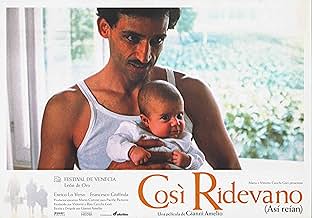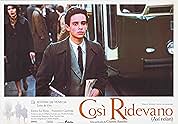अपनी भाषा में प्लॉट जोड़ेंTurin at the end of the fifties: two brothers have emigrated there from Sicily and the older works very hard to let the younger study and free himself from poverty through culture. The boy h... सभी पढ़ेंTurin at the end of the fifties: two brothers have emigrated there from Sicily and the older works very hard to let the younger study and free himself from poverty through culture. The boy however is not keen on school and would like to begin to work. When after some time he gets... सभी पढ़ेंTurin at the end of the fifties: two brothers have emigrated there from Sicily and the older works very hard to let the younger study and free himself from poverty through culture. The boy however is not keen on school and would like to begin to work. When after some time he gets his degree however things take a violent and dramatic turn......
- निर्देशक
- लेखक
- स्टार
- पुरस्कार
- 9 जीत और कुल 14 नामांकन
फ़ीचर्ड समीक्षाएं
The film is separated into six parts labeled "Arrivals," "Deceptions," "Money," "Letters," "Blood" and "Families", each taking place on one day during the period from 1958 to 1964. While this technique allows us to understand the events taking place in Italy during this period, the sudden changes in the lives of the characters is difficult to follow and we are left having to put the pieces of the puzzle together on our own. As the film opens, Giovanni (Enrico Lo Verso), a poor illiterate worker arrives from Sicily to visit his teenage brother Pietro (Francesco Giuffrida) in the industrial north of Italy who is studying to become a teacher. Determined that his brother Pietro will get a good education, he decides to remain in Turin to support him.
It is clear from the outset that all is not well with Pietro. He hides behind a pillar at the train station rather than meeting his brother, then goes out of way to help a Sicilan family who are lost until he finally gives up in disgust. He is very handsome but there is a haunted look in his eyes and it is never clear what his secrets are. Giovanni, magnificently portrayed by Lo Verso, is quite different. He is a giving person -- open and warm hearted. He sacrifices for Pietro, working low paying menial jobs but the younger brother seems unmotivated and does not take studying very seriously. Their love is not at issue, but each has an idealized picture of the other and they never fully come to grips with each other's reality.
As the years go by, Giovanni begins to move up the economic ladder and becomes a low-level Supervisor, then the boss of a cooperative. Pietro meanwhile has gone to a private teacher and has received his degree. The brothers remain close but when Pietro witnesses Giovanni getting into a fight with a presumed underworld figure, the consequences that result from self-sacrifice and the betrayal of morality are explored in a powerful conclusion. Like Giovanni's rise to a position of power through suggested shady dealings, The Way We Laughed seems to be saying that as modern Western societies have become rich, they have arrogantly forgotten the values it took them to get there.
"Così Ridevano" is a human movie about the relationship between brothers, and characters and fraternal sacrifices. The story is developed from 1958 to 1964, showing the economical situation of Italy, more specifically of Turin, and how the Southern immigrants from Sicily were treated and explored by their employers. It is touching to see how Giovanni respects the books and sees the importance of education contrasting in a counterpoint with the feelings of his reckless brother. The screenplay is divided in six chapters ("arrivals", "deceptions", "money", "letters", "blood" and "families") and uses ellipsis, jumping through the years and leaving many situations unresolved as if they were kept in secret. The storyline has many points in common with Luchino Visconti's masterpiece "Rocco e i Suoi Fratelli" (Italy in early 60's, the fight for survival of a family from the countryside in Milano and the relationship among brothers). However, the plot is never corny and the conclusion is totally unexpected and unpredictable. My vote is eight.
Title (Brazil): "Assim É Que Se Ria" ("That's the Way We Laughed")
It shows one day in their life each year between 1958 and 1964, avoiding movie convention by not filling in the details of what's gone on during the time in between. It's left to us to figure out, or imagine.
While brave and challenging, the characters never fully develop, sometimes feeling more sketchy and symbolic than full blooded.
Early on I thought I might be watching a masterpiece, but as it went on, I felt (to quote Chicago Reader critic Jonathan Rosenberg) 'guilty for not liking it more'. Still, a strong and original enough film that I'd like to revisit it one day, and see if it grows even deeper on 2nd viewing.
Giovanni's love and personal honor require that he believe no ill about Pietro. The older brother works like an ox to shield his Pietro-on-a-pedestal from the harsh world of manual labor, to give him better lodgings than he himself enjoys and to keep him in school (where Pietro actually is an inveterate hookey-player and a bored, listless daydreamer).
Though Pietro is detached he nevertheless feels guilt for his deceptions and he loves Giovanni for his sacrifice and natural goodness. ("Giovanni is far too good," he says to the whore-waif his older brother has taken under his protection. "He loves everybody").
But while the facile and literate Pietro drifts, the illiterate but intelligent Giovanni makes useful friends, exploits opportunities and rises in life.
Always Pietro remains at the center of Giovanni's heart. And one night Pietro is given the opportunity, finally, to repay Giovanni's selfless devotion.
If there is a "revelation" in this film, it is near the end when we see that the adoring Giovanni has an unexamined, unquestioned faith that his Pietro has the same devotion to him. As a given, he believes that brotherly sacrifice is a two-way street. The immense decision that his younger brother has made against himself and for Giovanni is merely the kind of thing brothers do for eachother. In a horrifying moment Giovanni opens to us: his great love is unselfconsciously, blanketingly possessive, devouring.
Palermo-born Lo Verso is a great actor. That his beautiful, movingly expressive face is not world-famous is a misfortune. But he is only forty now (early thirties in "Cosi Ridivano"). There is time. Jim Smith-----------------------
क्या आपको पता है
- ट्रिवियाThe title refers to the back page of a popular 1950s Italian magazine which had a section devoted to old jokes that were no longer funny but still evoked a sense of nostalgia. One such joke is repeated throughout the film: "How do you get four elephants in a Fiat?" The answer: "Two in front and two in back".
- कनेक्शनReferenced in Cannes Paradise (1999)
- साउंडट्रैकCucara cha cha cha
Written by Tony Vargas and Pepe Villa
Performed by Dámaso Pérez Prado
Courtesy of Peer International Corp./Edizioni Peersongs Italy Srl
टॉप पसंद
विवरण
बॉक्स ऑफ़िस
- US और कनाडा में सकल
- $57,009
- दुनिया भर में सकल
- $57,009
इस पेज में योगदान दें






















